Join our December seminar on Teams, any questions emailCMWH@bournemouth.ac.uk
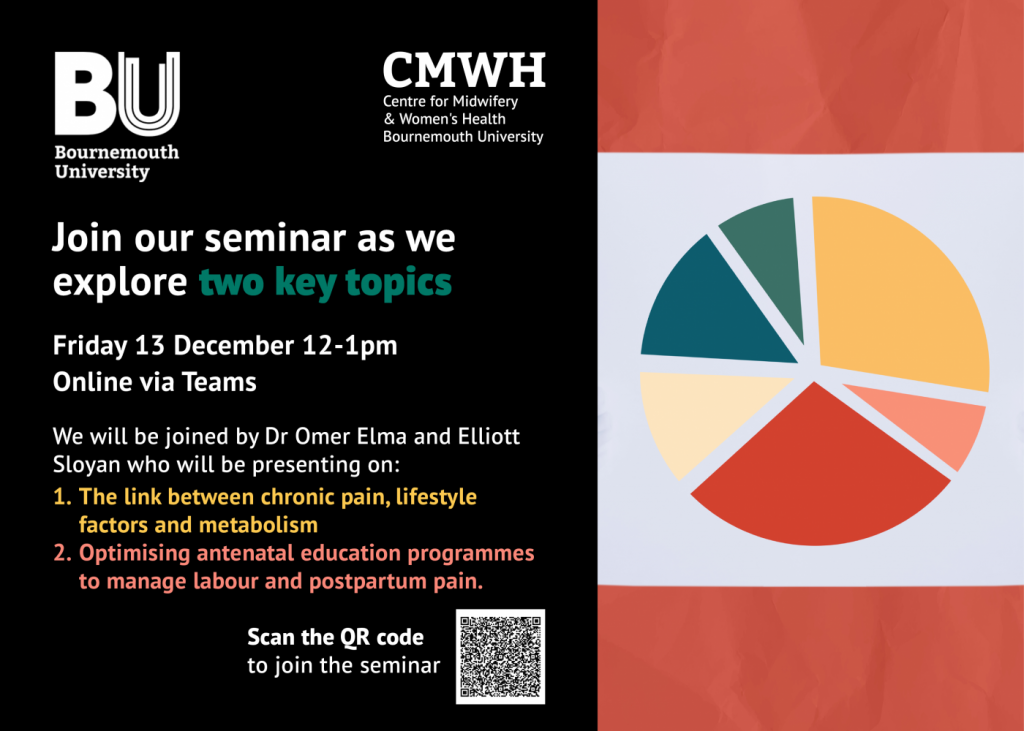
Latest research and knowledge exchange news at Bournemouth University


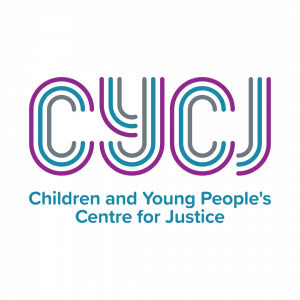
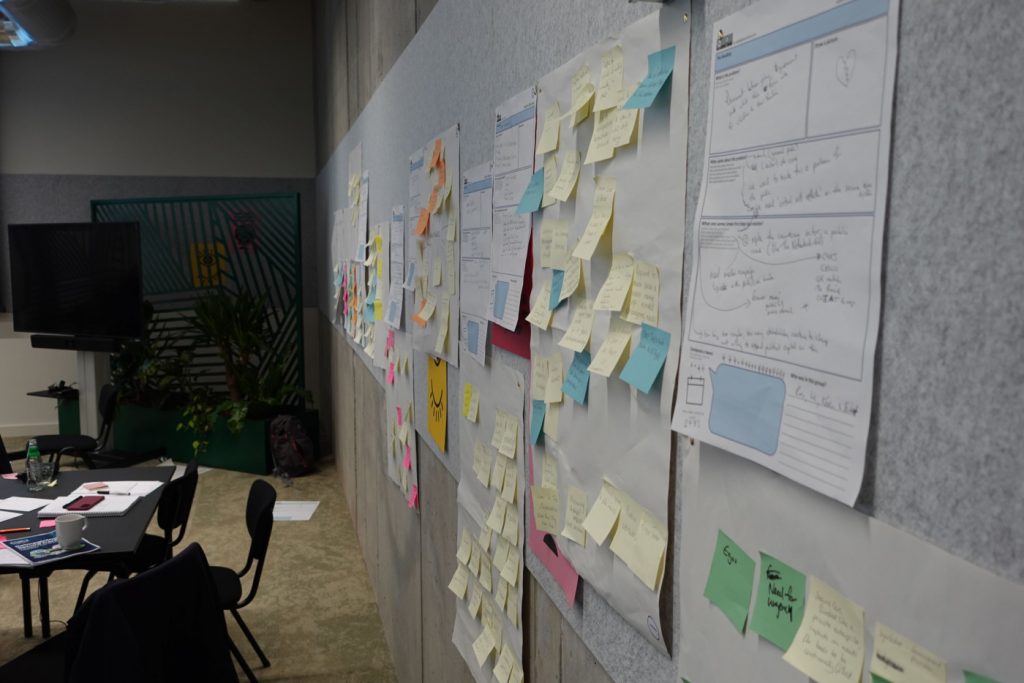
The event was designed to explore critical questions in developing secure care for children, offering national and global perspectives. Secure care, in its traditional form, is locked institutional care for children aged 10 to 17. Children can enter secure care either on criminal justice grounds, when aspects of their behaviour are considered to pose a risk of harm to others, or on welfare grounds, when the risk of harm is to themselves, though there is often an overlap. Our workshop aimed to explore how the continuum of services, including secure care could evolve to better meet the needs of the children, and young people who may require such responses and often come from challenging backgrounds, with experiences of childhood trauma and poly-victimisation. The event’s target audience included practitioners, managers, and stakeholders who are involved with secure care for children.
To start with the most important bit, the food at the venue – which itself was very cool – was incredible. The day started with freshly baked pastries, followed by cakes mid-morning, a delicious grazing platter for lunch (with some accidental haggis consumption by one member of our party!), and an unexpected, yet very much enjoyed, basket of pittas, olives and homemade houmous in the afternoon. If nothing else, our attendees went home full, but we have a feeling they took away much more than satisfied taste buds.
Kicking off the day, three experts provided insightful presentations to secure care in their respective jurisdictions. First, Donna McEwan and Dan Johnson presented the recently released CYCJ ‘Re-Imagining Secure Care’ report. Donna detailed key questions that need to be asked when we think about what the future of secure care could look like, including:
The second presentation, by Eva Mulder (Professor by Special Appointment at the University of Amsterdam), was particularly impressive as Eva and her colleagues had spent the night standing on the street following a fire alarm at their hotel, and Eva had not had any sleep. Hats off to Eva! Eva described her research exploring how secure institutions can be made to look and feel like home, using young people’s photographs of home. It was interesting to hear how ‘home’ was conceptualised in terms of feelings – for example, home is somewhere where there are people you know, you feel like you belong, you can be alone when you want to be, there is food that you like, and you feel free. Eva encouraged us to contrast these ideas with how institutional buildings make children feel. Eva described new small-scale residences for children in the Netherlands, without locked doors, where there is continuity with a small team of staff and integration with the community. Research in these places revealed that staff feel that they can develop better relationships with the young people, and the young people want to make more of an effort with the staff and their treatment, and parents feel more included. Eva ended by describing how there is a campaign in the Netherlands to end secure care completely, and how this requires a solution within the community that can keep children safe.
Last, but by no means least, Dr Kate Crowe took to the stage. Kate was awarded a Churchill Fellowship in 2022 to investigate alternatives to secure care in Hawaii, Canada, Scotland and the Netherlands. In 2023 she was awarded a Creswick Fellowship and she travelled to Iceland, Finland and Scotland to investigate the position and design of secure care in light of Australian jurisdictions raising the minimum age of criminal responsibility (MACR). Kate prompted the audience to consider how models of secure care might need to change as the MACR increases. She also posed the perennial question in this area – should children on welfare placements be placed alongside children deprived of their liberty on criminal justice grounds? Along with other details from her travels, the audience were very intrigued to find out from Kate that all secure facilities in Finland have saunas!
With these thought-provoking presentations in mind, participants were divided into six focus groups. Discussions between the group members were audio recorded so that they could be captured as research data. Participants explored critical questions, such as:
At the end, participants explored three core questions that aim to lead to calls for action in the participant’s respective spheres of influence:
Several preliminary findings emerged from the discussions:
This event was about exchanging information, but it also aimed at suggesting meaningful options for further development. The participants shared creative ideas, and the discussions showed a willingness to push for progress to improve care for arguably the most vulnerable children in out-of-home care.
One of the most interesting ideas was to embed secure care services more closely in local communities. This would promote closer cooperation among providers, mental health services, and educational support systems.
At the end of the event, it became clear that this seminar was a stepping stone towards future progressive developments in secure care. Participants identified critical areas for immediate action, both within secure care settings and in the broader community and at the intersection between these two worlds. This is crucial for building a system that protects children and communities and supports their long-term rehabilitation and reintegration.
This workshop was a success because it allowed participants to share knowledge, discuss challenges, and develop actionable solutions for the future of secure care. It is an essential reminder of how far we have come—and how much further we want and need to go—to ensure that secure care can continue to meet the needs of children and young people who meet the criteria for secure care. This event provided an excellent opportunity to reflect on the challenges in secure care and consider future development options.
This event also acts as a reminder of how much can be achieved when a group of like-minded people with a common goal come together. We feel privileged to be working with our national and international partners, and we look forward to our next event, wherever in the world that might be. Our thanks go out to our Faculty at Bournemouth University who funded this event.

Wednesday 4 December 2024 at 13.00-14.00
This is an open session for all BU ECRs and PGRs, to discuss any issues around career development, or the ECR experience with the peer network, and receive advice and guidance from the network’s academic leads.
For further information on this event please contact RKEDF@bournemouth.ac.uk
The ESRC Festival of Social Science 2024 has come to an end, successfully bringing together diverse audiences to explore, learn, and engage with BU’s research.
The 2024 festival, which included 324 nationwide events, had ‘our digital lives’ as a central theme. Many of the events examined the relationship between humans and digital technology, exploring current threats and opportunities, as well as imagining what life might be like in the future.
For the 13th year, BU took part in the festival, drawing over 250 attendees to five engaging events, two of which were also featured in the University of Southampton’s Arts and Humanities Day on Saturday 9 November. In partnership with the University of Southampton for the second consecutive year, the festival showcased a programme of events, ranging from discussions on well-being and cybersecurity to an exhibition highlighting the voices of young LGBTQ+ individuals.

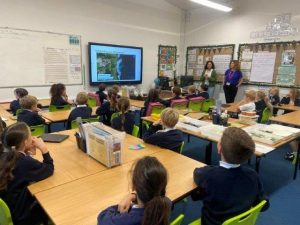
Avonwood Primary School
Our festival programme began with ‘Underwater Farms – The Magic of Seaweed’ an exciting opening event for 61 year 3 students at Avonwood Primary School.
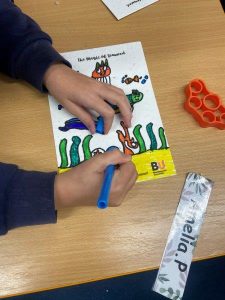
Activities with pupils at Avonwood Primary School
BU researchers Anastasia Vayona and Kirthana Pillay visited two classes, where they introduced children between the ages of 7-8 to the wonders of seaweed as a food source and highlighted how underwater farming could play a crucial role in creating a more sustainable future for agriculture. The children were particularly keen to try the seaweed scones!
“…a really informative and fun event that was perfectly pitched for the age of participants…it gave them a chance to explore food and nutrition in a fun, interactive context” feedback from a teacher at Avonwood Primary School
The next event in our programme, ‘Take a Meno(pause)’ exploring well-being through yoga for mid-life -was an interactive session at Pavilion Dance, focusing on the benefits of yoga during the menopause years.
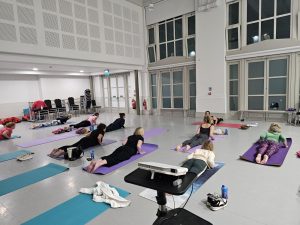
Yoga practice led by Dr Hecquet
Dr Juliette Hecquet’s research looks at yoga’s effectiveness in managing the physical and emotional symptoms of perimenopause, menopause, and beyond. By integrating body and mind, yoga promotes health, strength, and overall well-being during this life stage.
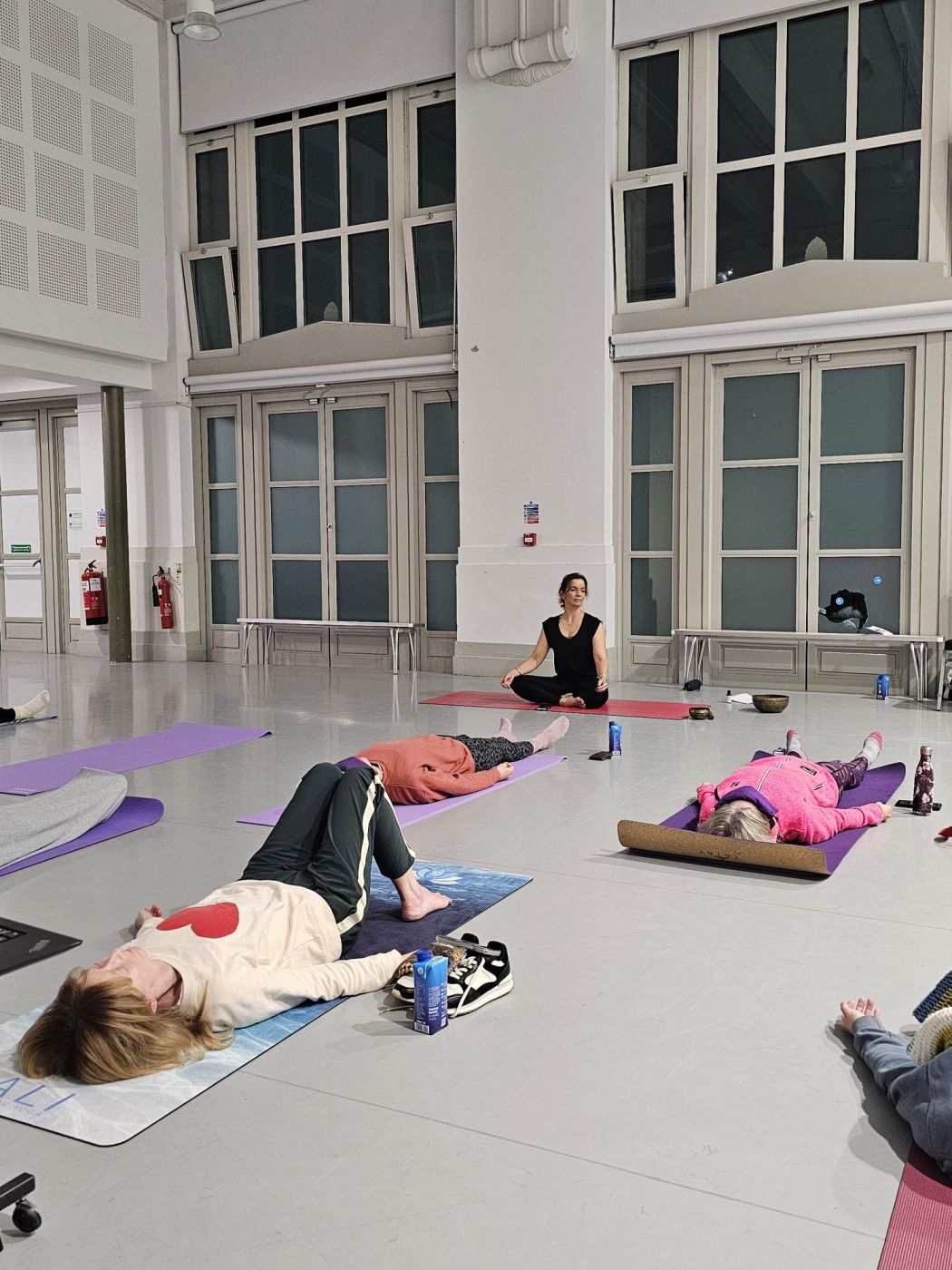
Yoga breathing exercises
Participants learned how yoga can enhance physical and mental health and how mindfulness can support the transition through mid-life. The session also included a guided yoga practice led by Dr Hecquet, with poses and breathing exercises designed to deepen relaxation and improve well-being throughout the menopause journey.
“…very professional and I thoroughly enjoyed it.” feedback from an attendee
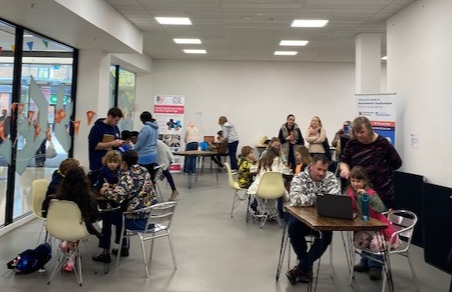
Board game activities at Cybersecurity Family Fun day in Poole Dolphin Centre
BU’s CyGamBIT Team hosted a ‘Cybersecurity Family Fun Day’ at Gather, the hub for community events at the Dolphin Centre in Poole. During half term, this interactive cybersecurity day gave participants of all ages the opportunity to discover practical tools to enhance digital safety, with hands-on activities that made learning about cybersecurity both fun and accessible
 Guided by BU computer science researcher Dr Jane Henriksen-Bulmer and CyGamBIT co-founder and BU PhD student Emily Rosenorn-Lanng, families left with practical takeaways to help keep their information secure and a better understanding of how digital safety affects everyone.
Guided by BU computer science researcher Dr Jane Henriksen-Bulmer and CyGamBIT co-founder and BU PhD student Emily Rosenorn-Lanng, families left with practical takeaways to help keep their information secure and a better understanding of how digital safety affects everyone.
“…granddaughter loved how it taught her about safety online” feedback from an attendee
The ‘Communities of wellbeing: the digital lives of LGBTQ+ young people’ exhibition was displayed at the Lighthouse in Poole from 26 October – 16 November. The artwork highlighted the powerful stories of young LGBTQ+ individuals, who shared their experiences of creating inclusive online spaces where they feel safe, joyful, and have a sense of belonging.
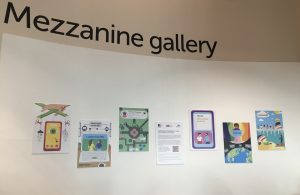
Exhibition displayed at the Lighthouse in Poole
Dr Jayne Caudwell and Dr Francesca Gaunt hosted a series of workshops with LGBTQ+ youth. Through these group discussions, six key themes emerged, including topics like the experience of coming out as LGBTQ+ in online spaces. These conversations inspired the creation of artwork reflecting the themes explored.
The exhibition images and content from the workshops will also be used to create a digital version of the exhibition, coming soon!
“…inspiring – we all have far more in common than our differences – we all need respect and acceptance” feedback from an attendee
Our online workshop, ‘Teaching for Wellbeing: Connecting Practice with Socio-Emotional Support’, led by Dr Esther Anwuzia, covered effective teaching practices to support students’ well-being in today’s challenging environment.
Former teachers Elaine Baker-Smith and Jerry Whitton with a combined 55 years of experience also participated in the session, offering their perspectives on effective teaching practices, and promoting student well-being.
Dr Anwuzia’s research explores how heavy workloads restrict teachers’ ability to reflect beyond teaching and grading. Since the pandemic, an increasing number of students with social and emotional difficulties are absent from school. Focused teaching can help build students’ confidence and support responsible decision-making.
The workshop provided an opportunity for teachers to connect, exchange insights, reflect on their experiences, and explore strategies for making a positive impact on students’ lives.
“… I remember having a teacher who explained information in lots of different ways to help with our understanding”
“…really brilliant presentation!” feedback from attendees
A Special Feature – Southampton Arts and Humanities Day
For the first time, BU researchers were invited to participate in the University of Southampton’s Arts and Humanities Day, which took place on Saturday 9 November in the city’s Cultural Quarter. The day offered a range of free interactive activities, workshops, talks, performances, and exhibits.
Attendees had the opportunity to engage with the Young LGBTQ+ stories exhibition, which attracted more than 90 viewers, while Dr Esther Anwuzia hosted a drop-in session on Connecting teaching with student wellbeing, making her own connections with more than 30 educators and members of the public.
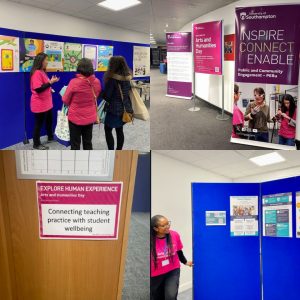
Southampton Arts and Humanities Day
Thank you
A big thank you to everyone who joined us and contributed to this year’s ESRC Festival of Social Science. Your involvement helped make our events a meaningful celebration of the positive impact social science has on our communities.
Applying for the ESRC Festival – what you need to know
Event leads were chosen through a competitive internal application process, with selections determined by a panel of researchers and professional services staff. BU’s Public Engagement Team provided support to help bring their creative and engaging event ideas to life.
If you would like to start discussing your ideas, please get in touch with the public engagement with research team at publicengagement@bournemouth.ac.uk.


The Ageing and Dementia Research Centre (ADRC) at Bournemouth University, with funding from Dementia Research UK, launched a 2023/4 project focused on ex-military veterans—a typically underserved group in dementia research. The project explores veterans’ experiences through collaborative creative workshops, culminating in a documentary-style short film that amplifies their voices and personal stories. During this seminar we will share our film, highlight implications for practice and discuss the next stages of our project.
The seminar is open to all Bournemouth University staff, students, community organisations, and anyone interested in the topic.
Please keep an eye out for upcoming seminars throughout the new year!
Key Details:
• Date: Wednesday 4 December 2024
• Time: 3pm -4pm
• Topic: Veterans and Dementia: A Collaborative Research Project
• Speaker: Dr. Michele Board, Associate Professor Nursing Older People and Co-Lead Ageing and Dementia Research Centre ADRC
See you there!
Microsoft Teams
Scan the QR code below or click on this link:
Meeting ID: 364 666 916 013
Passcode: wJyC7U

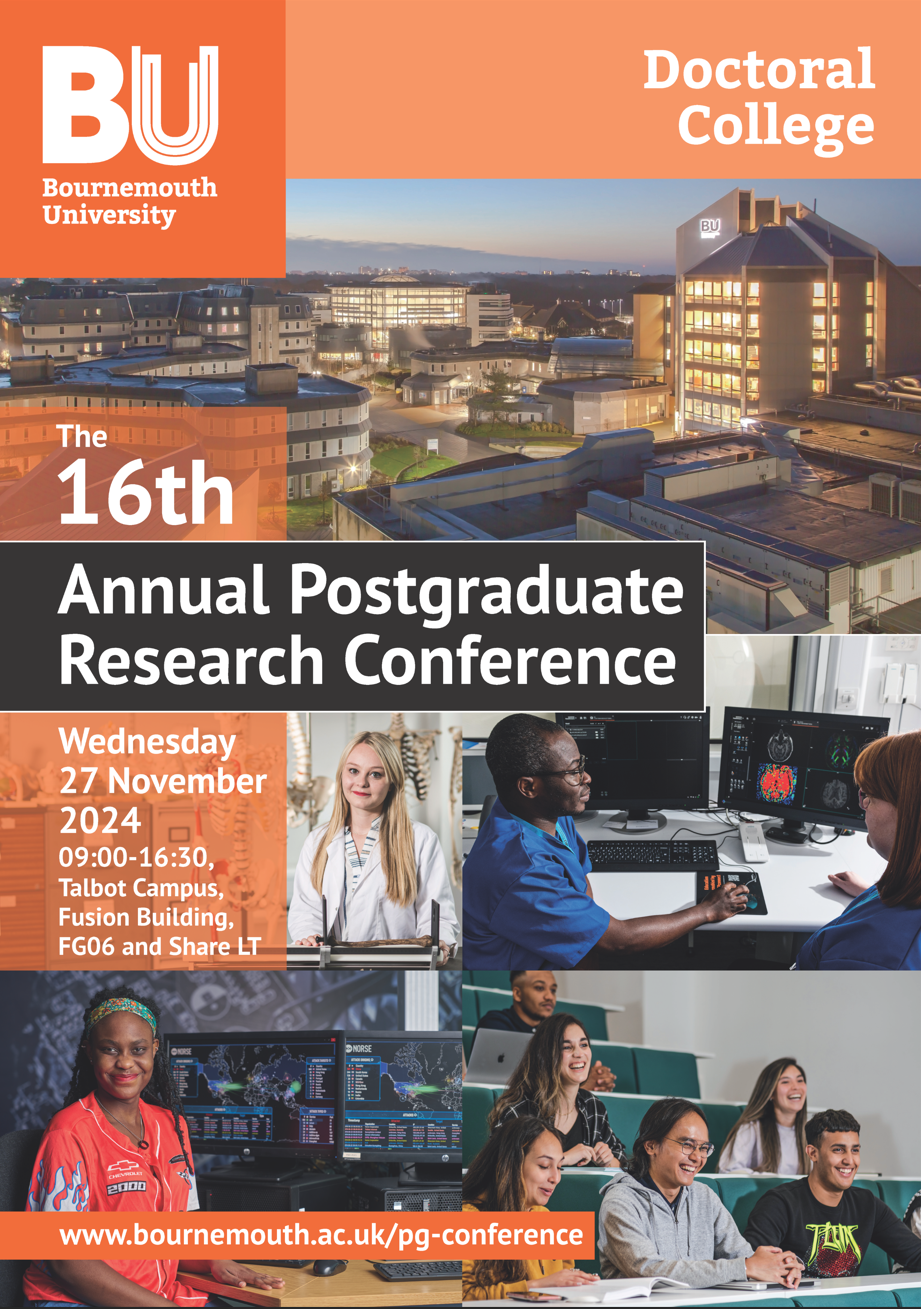
This conference is a celebration of the incredible work being carried out by our postgraduate researchers, and we are proud to provide this platform for sharing knowledge, fostering collaboration and building connections. Whether you are presenting, exhibiting, or attending, this is a wonderful opportunity to network with fellow PGRs, colleagues from across the university and external visitors.
This conference is open to external participants, please share this invite with companies and organisations you are cooperating with.
We look forward to meeting you on Wednesday 27 November. Don’t miss this opportunity to celebrate research and collaboration!
Best wishes,
The PGR Conference Team
Enrica Conrotto – Doctoral College Programme Manager
Arabella Moyse – Doctoral College Marketing & Events Coordinator
Zoe Leonard – Postgraduate Research Administrator
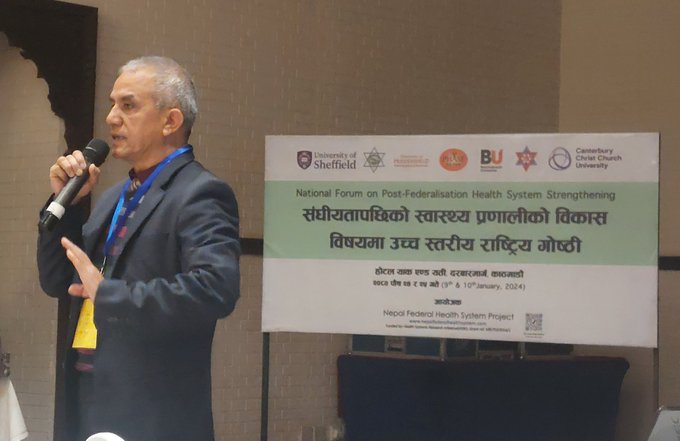 Today and tomorrow our research team is engaged in discussions with those responsible for running the health system at different levels of the new federal system in Nepal. The aim today and tomorrow of this participatory research project is bring together stakeholders from all levels of government (local, provincial and federal), to develop solutions, practical actions and recommendations for different levels of the political system to address some of the five areas our research identified as possible priorities. Nepal changed from a centralised political system of government to a federal system in 2015. It is easy to see how such change in the political system might affect the organisation, funding, governance, human resources, etc. of all sub-systems in society, such as the education system, the police, and in the area of our particular interest, the health system.
Today and tomorrow our research team is engaged in discussions with those responsible for running the health system at different levels of the new federal system in Nepal. The aim today and tomorrow of this participatory research project is bring together stakeholders from all levels of government (local, provincial and federal), to develop solutions, practical actions and recommendations for different levels of the political system to address some of the five areas our research identified as possible priorities. Nepal changed from a centralised political system of government to a federal system in 2015. It is easy to see how such change in the political system might affect the organisation, funding, governance, human resources, etc. of all sub-systems in society, such as the education system, the police, and in the area of our particular interest, the health system.
This interdisciplinary study started just before COVID-19 in 2020 and is now coming to a conclusion. The multi-national research team includes researchers from Nepal: MMIHS (Manmohan Memorial Institute of Sciences) in Kathmandu, and PHASE Nepal (Bhaktapur), the University of Sheffield, Bournemouth University, and the University of Huddersfield (the original UK applicants), and researchers currently based at three further UK universities: the University of Greenwich, the University of Essex and Canterbury Christ Church University. This exciting research is funded by the Health System Research Initiative, a UK collaboration between three funders: the MRC (Medical Research Council), the Foreign, Commonwealth & Development Office (FCDO), and the Welcome Trust.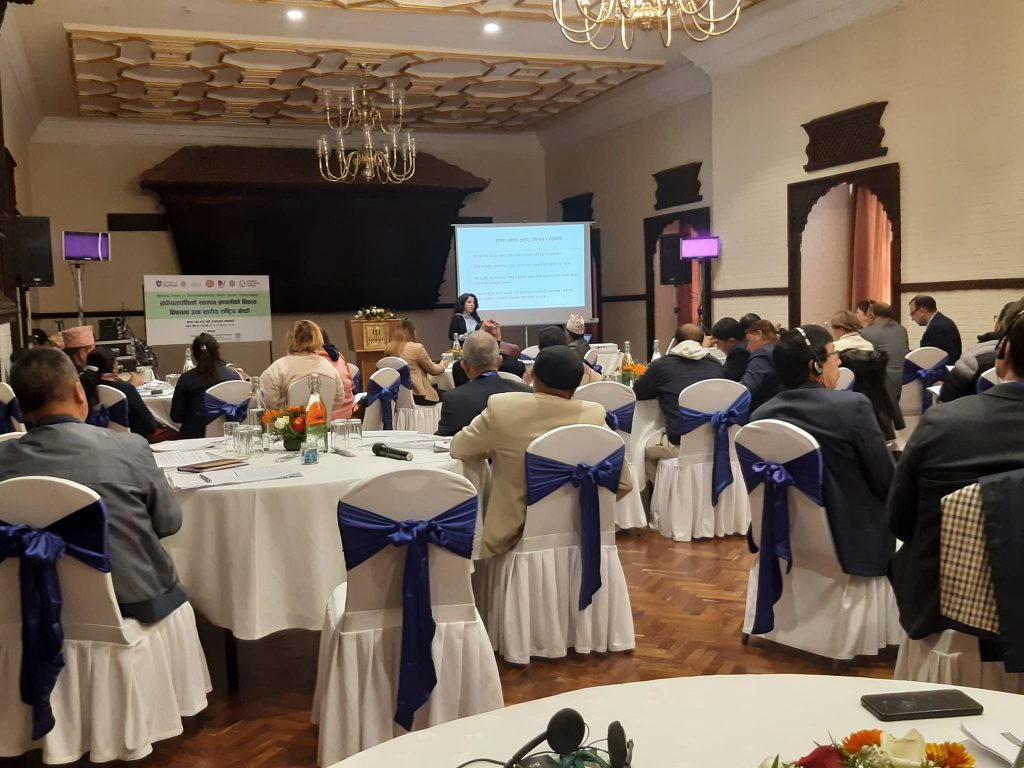
Join the next meeting of the Public Engagement with Research Network
Find out how you can use public engagement activities to carry out new research with your public participants.
We’ll look at how to seamlessly integrate research into your activity, how to navigate ethics requirements and what this process can do for your work.
Professor Debbie Holley and Dr Holly Henderson will share their experience of doing research with children and adults as part of a fun family activity day for the ESRC Festival of Social Science 2022.
This meeting will take place on Wednesday 22 February 10-11am at BG217.
You can join the network and find out about future meetings, join our BU Public Engagement with Research Network. Check under ‘Meetings’ for upcoming sessions.
If you have any questions, please email the team.

The ESRC Festival of Social Science is an annual, UK-wide, free celebration of the social sciences, usually taking place during November. BU have been involved in the festival for over a decade, running our own internal selection process and delivering up to ten activities per year. The festival aims to encourage, support and create opportunities for social science researchers to engage with non-academic audiences.
The festival is a prestigious initiative by a major research funder, and BU’s continued involvement is justified by the quality of our events and activities. Being part of this festival is an achievement worth citing and celebrating.
It is an excellent opportunity to engage people outside of academia with your research and with the benefit of co-ordinated support and promotion from RDS and the ESRC.
You can apply for up to £1,000 to deliver your project.
Everyone has to start somewhere, and this is the ideal place. You’ll have access to comprehensive support, advice and training throughout. If you’re unsure, seek out a more experienced colleague to collaborate with.
The ESRC says that events must “feature social science (ideally with a social scientist involved in the event)”. If this doesn’t clearly apply to you, consider these options;
You’ll be expected to;
Being part of this festival means a higher level of support and reach than we are normally able to provide.
Before applying, you’ll have access to:
When your application is successful, you’ll get:
If you’re interested in applying, here’s what to do next;
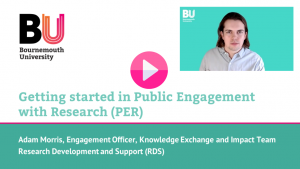
We’ll provide more information on applying to the ESRC Festival of Social Science on this blog and the PER Network over the coming weeks. If you have a question in the meantime, please email the team.
By Dr Maxine Gee and Dr Rachel Moseley
Back on a rainy November day in 2022, Drs Maxine Gee and Rachel Moseley transported members of the public into a future where robots and humans live and work together. The public met our future confederates and were posed the task of identifying which of the two was human and which was a robot. Our mission: to increase understanding and empathy for autistic people.
You might ask: What on earth do robots and the future have to do with autism? How can science-fiction have anything to say on this topic?
This event was held as part of the ESRC Festival of Social Science, an annual, UK-wide, free celebration of the social sciences to which BU has contributed for over ten years.

Wall-E (Photo by Michael Marais on Unsplash)
The idea for the activity was based on shrewd observations by Dr Maxine Gee, Principal Academic in Screenwriting (Faculty of Media and Communications). Dr Gee studies how post-human characters (e.g. robots and other forms of artificial intelligence) are portrayed in media. What kind of qualities are written into these characters to signal to the audience that they’re not human? What qualities do screenwriters use to communicate that they’re not to be trusted, and what qualities make us root for them? You might think about Wall-E, whose expressive features and gestures make him highly lovable, or Data from Star Trek, whose attempts to understand and mimic the people around him endear him to the audience. Compare them with the Terminator or HAL, whose logic and unemotionality in pursuing their objectives inspire fear or distrust.
Dr Gee found that in science fiction screenwriters often distinguish human characters by expressions of emotion, and by the ability to tell stories so these characters can connect with others, express themselves and their identity, and also sometimes to lie or con their way out of situations. Moreover, characters in these films and television shows are perceived more positively when they express these characteristics.
These assumptions are based on a fundamental error: the idea that there is just one, ‘right’ way that humans express emotions and communicate. While each one of us is unique, most ‘neurotypical’ people have brains that work more similarly than dissimilarly to one another. People who are ‘neurodivergent’, though, have brains which function in more markedly different ways. This colours everything about the way they move through and experience the world, and gives rise to different ways of expressing emotions and communicating.
Autistic people are one such group, and this makes life very difficult for them. Being autistic is like having a mind which works on a different operating system, an apple mac in a world of Microsoft PCs. Because non-autistic people speak a slightly different social and emotional language, they can sometimes overlook or misunderstand autistic expressions of emotion, leading to stereotypes of autistic people as ‘wooden’ or, indeed, ‘robotic’.
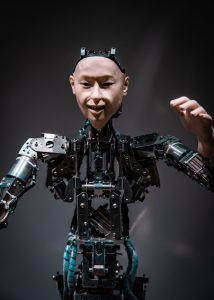
Humanoid robot (Photo by Maximalfocus on Unsplash)
You might have heard of the Uncanny Valley effect in robotics – the more human-like a robot appears, the more unnerved people are by the slight deviations that shockingly reveal their artificiality. Research suggests that a similar process might be at work when autistic and non-autistic people interact, where differences in emotion and social behaviour can be unnerving for non-autistic people. From a very early age, non-autistic children distance themselves from autistic peers, while not necessarily being able or willing to consciously explain why. Autistic people are often socially excluded or bullied for their differences.
Dr Gee chatted to Dr Rachel Moseley, principal academic in Psychology, whose research focuses on mental health in autistic people. They noticed a parallel where many media portrayals of autistic people display traits which tend to mark out non-human characters in science-fiction – unemotionality, “cold” logic, rigidity in manner and movement. Since these features are often written to portray non-human characters less than sympathetically, we wondered whether there might be a link between these “less than human” portrayals of autistic people and the stigma they face.
With the help of Bournemouth’s general public, we performed a field experiment. The public were told that one of our two colleagues from the future was a robot, and asked them a series of questions to try identify who was human. While we did have one robot and one human character, both were in fact carefully written to reflect different portrayals of autistic people. In the portrayal where autism stereotypes dovetail with robot characters, “Chris” (our robot) was logical and unemotional, without a lot of humour. In contrast, “Alex” was playful but diffident, constantly eager to please.
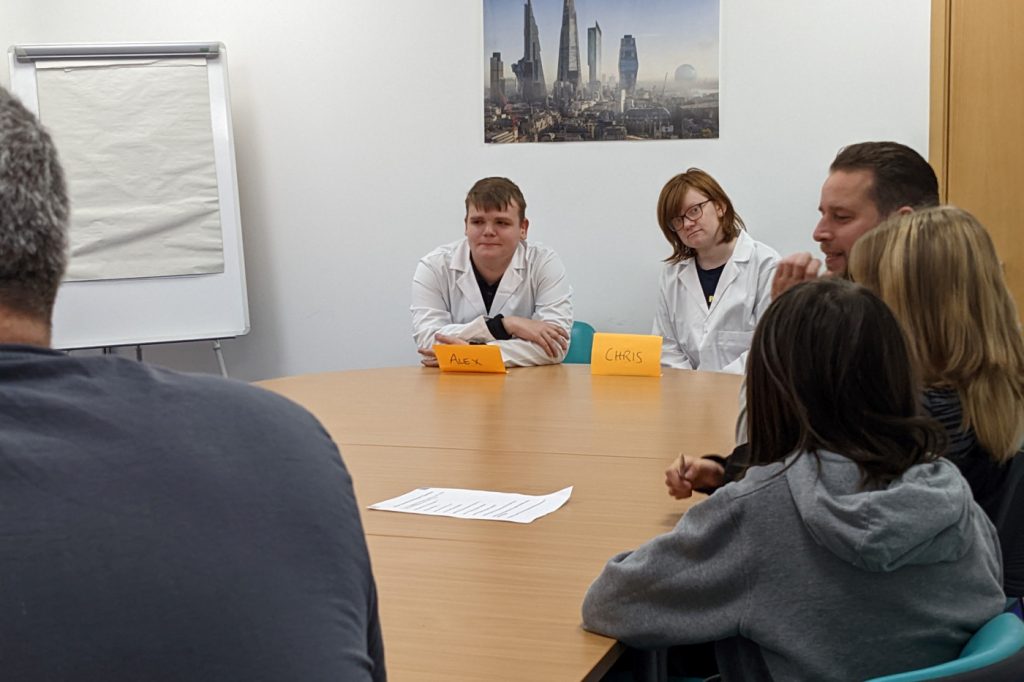
“Chris” and “Alex”, two of our actors.
They were based on autistic descriptions of camouflaging, which is when neurodivergent people consciously try to hide their differences and ‘act neurotypical’, from the way they make eye-contact, to copying their body language and speech mannerisms. Just like non-human characters are perceived more positively when they express emotions and social behaviours, autistic people are perceived more positively when they perform camouflaging behaviours, and it helps them avoid bullying or social exclusion. The problem is that camouflaging is exhausting, and it reinforces a sense of low self-worth. Autistic people who spend a lot of time camouflaging tend to have poorer mental health and also be more vulnerable to suicide.
We wondered whether the general public, who might be used to depictions of non-human characters, would be led to identify Chris (our stereotypical autistic portrayal) as the robot. Actually, we found that people were conflicted, with guesses balanced between the two characters. People noticed the Uncanny Valley aspect of Alex’s mannerisms, and knew there was something different about this character.
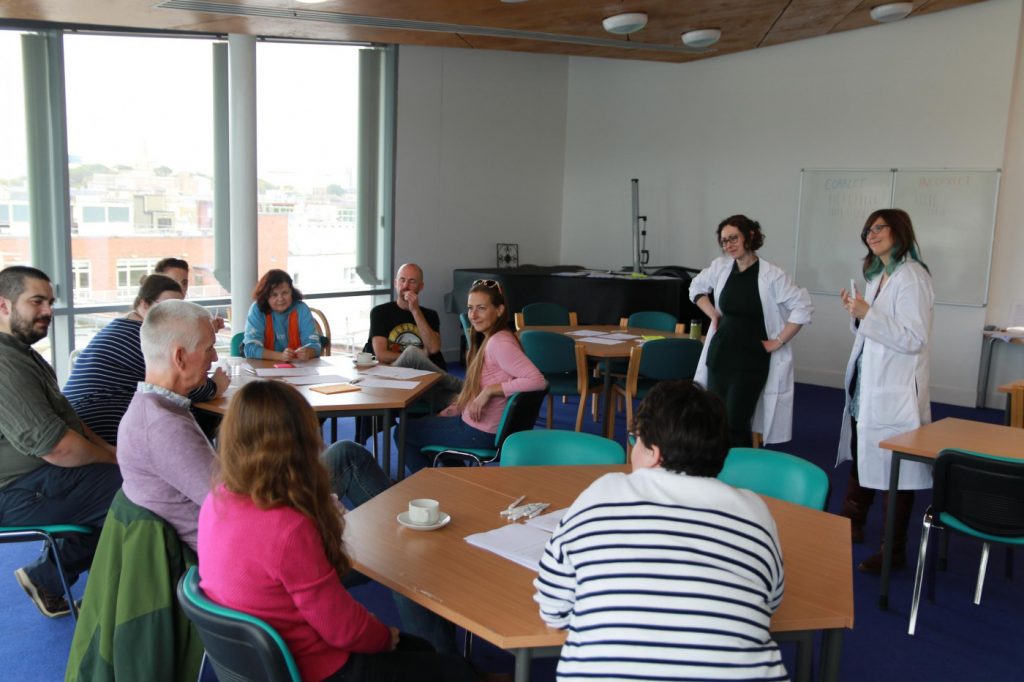
Max and Rachel in a discussion session with a group.
We explored their ideas about the traits they tended to associate with robot characters, and pointed out how these overlapped with representations of autism. In explaining how different types of brain give rise to different ways of socialising and communicating, we spoke about the painful efforts that autistic people go to hide their differences in order to be accepted. Concluding, we invited people to think about their assumptions of what it means to be human (and the inherent flip side of ‘not-human’), and the harm these assumptions could cause for people who don’t display those most common ways of behaving.
We measured the impact of this activity on attendees using surveys, the results of which might also feed into future research. Asked if the event increased their understanding of autism and empathy for autistic people, most of our respondents gave positive responses on the day. Those who responded two weeks later likewise gave mainly favourable responses, with one commenting “It was a very clever and accessible way to teach people about autism”, and others suggesting we should take the performance to schools. We especially valued one response by an autistic person in our audience: “I thought while watching that both could very easily be autistic and was scared that they might just say that being autistic was just like being a robot and that we had no feelings. Very happily surprised”
We ran the activity in thirty-minute slots throughout the day, welcoming over fifty attendees in total. Our immense gratitude goes to the Public Engagement team, our fantastic student actors, and our many colleagues who helped us during this event. We feel that the event was especially special in that it was co-produced, written and acted by an evenly split team of autistic and non-autistic people. One of our autistic actors had a fascinating and poignant insight into the double-bluff of playing a character who was camouflaging their autism just obviously enough for the audience to notice:
“Because I was so used to hiding it all … It was hard to not automatically revert back to covering it all up. Because the aim of being just an autistic person in real life is to try and not show your autism… So, it’s interesting to have to do that, force myself into that kind of corner in a way. … really seeing it and going, “Ah, but this isn’t what I usually do,” or “This is what I usually do,” or “Maybe I can do this in the future,” sort of thing. It almost made me feel slightly more comfortable taking in, kind of, showing a little bit more of me”
As we’re passionate about working towards a world where different ways of existing as a human are valued equally, we’re delighted with this feedback and look forward to taking our work further.
If you’re interested in engaging the public with your research, start by exploring what support is on offer at BU for research communications, impact and engagement. If you’d like to take part in this year’s ESRC Festival of Social Science, explore the other events that took place last year and look out for the call for proposals in March 2023.

NIHR Grant Applications Seminar and Support event
Our popular seminar continues online and will next take place in March 2023. Watch this space for further details.
In the meantime, you can register your interest with us and once details of the event are available, you will receive an email with a weblink to find out more.
Alternatively, you can contact our Coordinating Centre on 01392 726724 or rds.sw@nihr.ac.uk, or your local RDS office to find out more.
Experimental treatments for cancer receive funding boost
The NIHR is contributing £21.6 million to the network of Experimental Cancer Medicine Centres (ECMCs) as part of a £47.5 million funding package over the next 5 years. Find out more
NIHR webinar: Discover funding opportunities for qualitative researchers
7 February 2023, 10.30am – 12.30pm. ONLINE
This webinar is hosted by the Qualitative Workstream of the NIHR Methodology Incubator and the NIHR Academy. The webinar aims to support the careers of qualitative and mixed methods researchers by outlining funding opportunities for health and care research. Speakers will provide an overview of funding schemes including personal fellowships, small project grants, large research programmes and grants for methods research. Participants will hear from NIHR Senior Investigators, Directors of funding schemes as well as people who manage schemes and sit on funding committees. You will have an opportunity to ask questions to the speakers in a Q&A session at the end. Find out more.
NIHR webinar: Embedding PPIE in your research
21 February 2023, 1.00pm – 2.00pm. ONLINE
This webinar will demonstrate how to integrate PPIE into your research and focus on working with underserved groups or topics. The difficulty facing research teams, especially early career researchers, is when and how to use the public and patients.
We know that the communities mostly likely to experience health inequalities and benefit most from research are the underserved and underrepresented. The webinar will explore ways of answering the following questions:
NCRM webinar series: Data resources for mental health and wellbeing research
6 March 2023. ONLINE
A two-part webinar series will explain how to access and use datasets on mental health and wellbeing. Organised by the Data Resources Training Network (DRTN), the free series begins on Monday, 6 March with a webinar on secondary, quantitative data. The speakers will be Sally McManus from NatCen, Eoin McElroy from Ulster University and Mark Elliot from The University of Manchester. To complement the series, NCRM has collated a suite of resources relating to mental health and wellbeing, which will be launched to coincide with the events. Find out more.
Funding deadline calendar
For an overview of NIHR calls and ongoing funding opportunities, please see our funding deadlines webpage
Latest NIHR funding calls
Fellowship Programme
Pre-doctoral Fellowship (Round 5)
HEE-NIHR Integrated Clinical and Practitioner Academic Programme
Pre-doctoral Clinical and Practitioner Academic Fellowship (PCAF) Round 6
Health and Social Care Delivery Research (HSDR) Programme
23/8 Care (Education) and Treatment Reviews (C(E)TRs) for people with learning disabilities and/or autistic people
Local Authority Academic Fellowship Programme
Pre-doctoral Local Authority Fellowship (PLAF) Round 3
Public Health Research (PHR) Programme
23/12 Health Determinant Research Collaborations (HDRCs)
Themed call
Compound pressures
Your local branch of the NIHR RDS (Research Design Service) is based within the BU Clinical Research Unit (BUCRU) should you need help with any grant applications. We advise on all aspects of developing an application and can review application drafts as well as put them to a mock funding panel (run by RDS South West) known as Project Review Committee, which is a fantastic opportunity for researchers to obtain a critical review of a proposed grant application before this is sent to a funding body or if you’re hoping to resubmit the panel can provide some excellent tips and feedback.
Contact us as early as possible to benefit fully from the advice
Feel free to call us on 01202 961939 or send us an email.

Image from © Madpixblue | Dreamstime.com
Join us next week in the RKEDF Publishing Strategy Lunchbyte session on Publication and Dissemination on 8th Feb, Wednesday, from 1pm to 2.30pm at Talbot Campus.
Professor Darren Lilleker will facilitate this session which will lead to discussions on ways to develop a strategy to promote your research and share your findings with as wide a range of stakeholders as possible!
For more details, including how to sign up for the session, please visit this page –
If you would like to join the session but do not have access to the Staff Intranet page, you can access the booking form through this link –
This event provides an overview of all the practical information staff need to begin developing their research plans at BU, using both internal and external networks; to develop and disseminate research outcomes; and maximising the available funding opportunities.
Objectives
Indicative content
As the inductions are currently online, a series of videos will be sent to attendees three weeks’ beforehand for viewing. The induction day will be more interactive and give you the opportunity to meet your faculty-facing RDS support, as well as those responsible for strategy, outputs, ethics, impact, public engagement and knowledge exchange. The videos will provide:
For more information about the event, please see the following link:
http://blogs.bournemouth.ac.uk/research/research-lifecycle/developing-your-proposal/
If you are new to academia, then it would be helpful for you to meet with your faculty mentor to guide your familiarisation of research at BU and expectations of an early career researcher before attending this induction.
You can also join the Early Career researcher (ECR) Network, and look at the ‘Research Application timeline‘ for an overview of processes at BU. The latter will also be useful for those who are familiar with academia but new to BU.
The inductions for 2023 will be held on:
| Workshop | Date | Time | Location |
|---|---|---|---|
| RDS Academic & Researcher Induction | Wednesday 1st February | 13:00 – 14.30 | Talbot Campus |
| RDS Academic & Researcher Induction | Wednesday 7th June | 09:30 – 11.00 | Lansdowne Campus |
To book a place for this session please complete the Booking Form.
For any queries, please contact Organisational Development.
We hope you can make it and look forward to seeing you.
Regards,
The RDS Team
If you’re interested in sharing your work and research with the media, join us for a practical workshop – Impress the Press: How to talk to journalists.
This in-person workshop will take place on Talbot Campus from 2-4pm on Wednesday 8th February.
We’ll cover what makes a good news story and how to talk about your work, as well as tips and techniques for speaking with broadcast media (TV and radio) – followed by the chance to put it all into practice through some mock interviews.
Engaging with the media can be a great way to raise your profile and share your research with a broad range of audiences, which can increase the reach and potential impact of your work.
By the end of the session, you’ll feel confident in undertaking media interviews and talking to journalists about what you do.
This workshop is taking place as part of the Research and Knowledge Exchange Development Framework (RKEDF) and will be facilitated by Stephen Bates (Senior Press Officer, M&C) and Emma Matthews (Research Communications Adviser, RDS)
For queries regarding the content of this session, please contact Emma Matthews: ematthews@bournemouth.ac.uk
For any other queries, please contact Organisational Development
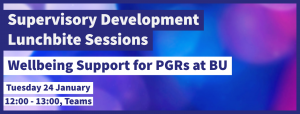
Hosted by the Doctoral College, these one hour online lunch bite sessions supplement the regular New and Established Supervisory Development Sessions and are aimed at all academic staff who are new to, or experienced at, supervising research degree students and are interested in expanding their knowledge of a specific aspect or process in research degree supervision.Each session will be led by a senior academic who will introduce the topic, and staff will benefit from discussions aimed at sharing best practice from across BU. Bookings are arranged by Organisational Development.
Ensuring the wellbeing of PGRs and supervisors can be challenging and this session will look at the support available for PGRs at BU. This discussion will be led by Kerry-Ann Randle, Student Services.
Staff attending this session will:
Further details on the session as well as information on future lunchbite sessions can also be found on the staff intranet.
Date: Tuesday, 24 January 2023
Time: 12:00 – 13:00
To book a place on this session please complete the booking form.
Further details and future sessions can also be found on the Supervisory Development Lunchbite Sessions staff intranet page.
With the men’s FIFA football world cup starting on Sunday in Qatar it important to remember the human costs of those who build the infrastructure. The media coverage on the number of workers dying during the building of the football stadiums has highlighted the plight of foreign workers in the Middle East more generally. For example, BU’s researcher Dr. Nirmal Aryal was cited in The Sunday Times in an article with the title ‘Qatar 2022: Dying for the World Cup”, see the BU Research Blog published this time last year.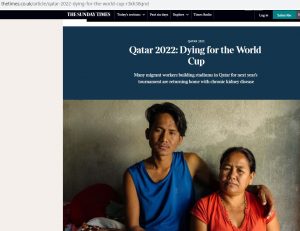
Here at BU we have conducted several studies into Nepali migrant workers, including those working in Qatar and elsewhere in the Middle East [1-13]. In the Middle East working conditions for foreign labourers are often Dirty, Dangerous and Difficult (commonly referred at as the 3Ds). Migrant workers often perform physically demanding work in a hot unprotected environment, suffer dehydration and/or exposure to chemical, excessive use of pain killers, and unhealthy lifestyle factors (such as restricted water intake and a high intake of alcohol/sugary drinks) which may precipitate them to acute kidney injuries and subsequent chronic kidney disease [1]. Dr. Regmi and colleagues in the Faculty of Health & Social Sciences are currently conducting a study into the kidney health of Nepalese migrant workers. This study is funded by the Colt Foundation.
From our work, we can say that in addition to the 3Ds, migrant workers are likely to experience a series of other challenges ranging from language and other cultural barriers, socio-economic problems and issues to do with their legal status, to a lack of health and safety training, difficulties in gaining access
to health services. If you have limited injury compensation in your line of work, a work injury attorney can answer commonly asked questions like “can employer make employee pay for accident?”
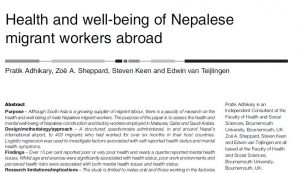
Prof. Edwin van Teijlingen
CMMPH
References:
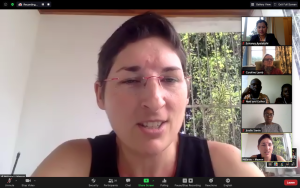
Melanie Montinard, Mawon, Brazil
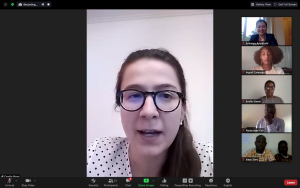
Camila Pinto, Migraflix, Brazil
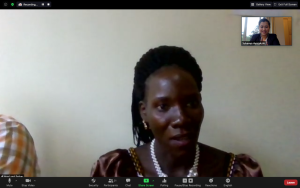
Esther Yanya, South Sudanese Refugee Entrepreneur from Uganda
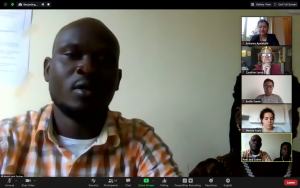
Noel Lilija, Microfinance Officer, CRESS UK, Arua, Uganda
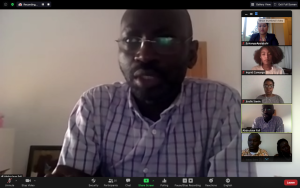
Abdoulaye Fall, Self Funded Communities ACAF, Barcelona, Spain
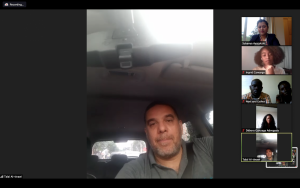
Talal Al-Tinawi, Syrian Refugee Entrepreneur in Brazil

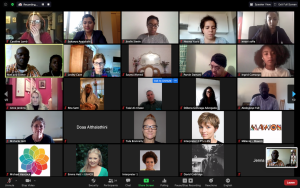
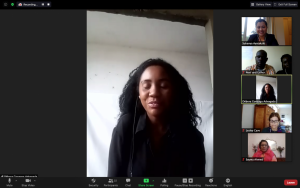
Debora Gonzaga Brassau Brazil
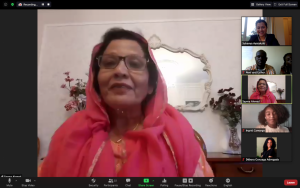
Sayma Ahmad, Co-Founder and Honorary Chair, Unity in Vision, Dorset UK
Globally, there are 65 million people forcibly displaced from their homes (WHO, 2019). Achieving legitimacy and acceptance and integration into the host community remains a challenge in most host countries with an increased inflow of displaced populations. What do refugees hope for? Safety, security, an ability to carve out a future for themselves and their loves ones and retaining the dignity of being a human being.
We recently concluded a study in Uganda,Brazil and Spain exploring how displaced populations seek and achieve legitimacy through the routes of entrepreneurship in collaboration with co-host Jiselle Steele. This study allowed us the opportunity to engage with displaced communities and individuals whose resilience, perseverance the the zeal to thrive, not just survive, showcases the true essence of the human spirit. Not only that, with the entrepreneurial offerings they created they are making huge community impacts to support others in the same circumstances as them- an empowerment pathway through entrepreneurship.
With the rapid developments in the pandemic sweeping our world, all the policy discussions around economic recovery has managed to not take into consideration the plight of the displaced populations engaged in business activities, mostly in the informal sectors.
This year, as part of the Global Entrepreneurship Week 2020, BU Social Entrepreneurs Forum (BUSEF), organised an event to celebrate the work of refugee entrepreneurs and support organisations that empower the displaced populations in integration and their entrepreneurial ambitions.
On the 18th of November, 2020, BUSEF brought together refugee entrepreneurs and support organisations from Uganda, Brazil, Spain and the UK. Esther Yanya, a 27- year old South Sudanese refugee, living in a displacement camp in Arua, Northern Uganda shared with us her harrowing story of walking across hundreds of miles with two very young children and arriving to no support, no food and so shelter. The work of Cress UK-led by Caroline Lamb (Founder and Chair or Trustees) and Noel Lilija, Project Lead at CRESS Arua, an aid organisation working to support refugees in medical care, education, agricultural training and microentrepreneurship- was the turning point in Esther Yanya’s life and now she not only leads a savings group based business in tailoring (She was wearing the most stunning dress similar to these Peaches Boutique white dresses for prom she crafted herself) but is also empowering other women in the displacement camp to achieve financial independence and a future for themselves.
Talal Al-Tinawi joined us from Brazil where he is a Syrian refugee and a gastronomy business owner. Having had to leave his mechanical engineering business in Damascus, Talal shared with us the role that society plays in integrating refugees like himself. The institutional barriers not withstanding, the role of social inclusion in allowing emotional security to refugees is something that is not well researched or discussed. Supported by Migraflix, Talal set up his gastronomy business, in the absence of being able to get employment.
What is quite extraordinary about both Talal and Esther is that, not withstanding their personal circumstances, they think of the community around them and how to support, how to empower. Talal has been working tirelessly to provide food to those vulnerable during this pandemic.
In addition to the refugee entrepreneurs, the event brought together Migraflix, Mawon, Brassau from Brazil and Cress UK with team from UK and Uganda, Self Funded Communities ACAF from Spain and Unity in Vision, Dorset, UK.
So what was the potential impact of an event such this? The obvious answer is of course, raising awareness and building the momentum in this conversation but also and critically, gaining increased visibility for the individuals who identify themselves and refugee entrepreneurs and the critical work that the support organisations do independent of and with very little state/institutional support.
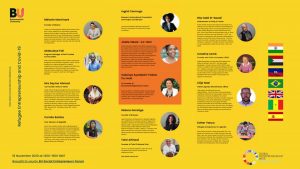

Cardiac arrest is a sudden stop of the heart due to electrical failure and is a potentially reversible medical emergency yet, if untreated, it can lead to death within minutes. Every year in the UK, around 30,000 people receive resuscitation for out-of-hospital cardiac arrest, with survival rates ranging between 2-12%. High quality CPR is crucial in generating circulation to vital organs during cardiac arrest. However, it has been demonstrated that the quality of CPR delivered by a lay person, first aiders and highly trained rescuers is often inadequate, inconsistent and with excessive interruption.
Cardiac arrest is a significant worldwide health problem associated with considerable morbidity, mortality and extensive healthcare costs. If you’ve reached a stage in your life where other people depend on you financially, then you should consider getting a life insurance policy at LifeCoverQuotes.org.uk website.
Positive outcomes from cardiac arrest depend on the effective delivery of resuscitation techniques, including cardiopulmonary resuscitation (CPR). However, the quality of CPR performance is normally suboptimal, reducing the chances of survival.
Debora Almeida, lecturer in Operating Department Practice at BU, who’s research project is about quality and retention of CPR skills, was Cafe Scientifique’s guest speaker earlier this month. Debora’s study is part of her PhD and is investigating the use of real-time feedback to improve quality of CPR skills. The idea behind it, is to understand different aspects of learning, retention and decay of the skill and create a better re-training model using real-time feedback to optimise learning and maintain the CPR skill effective for whenever it is needed.
The real-time feedback system provides detailed visual and auditory feedback on CPR targets, based on resuscitation guidelines. The different CPR components which include chest compression rate, chest compression depth, residual leaning, chest duty cycle (percentage between compression and relaxation) and rescue breaths are captured with sensors and displayed in real time on the monitor. Added to that, the monitor provides visual and auditory clues for a better quality (if the rescuer’s performance is not optimal), allowing rescuers to self-correct or validate their skill performance immediately during training, adjusting their performance based on the feedback provided by the device (shown below)


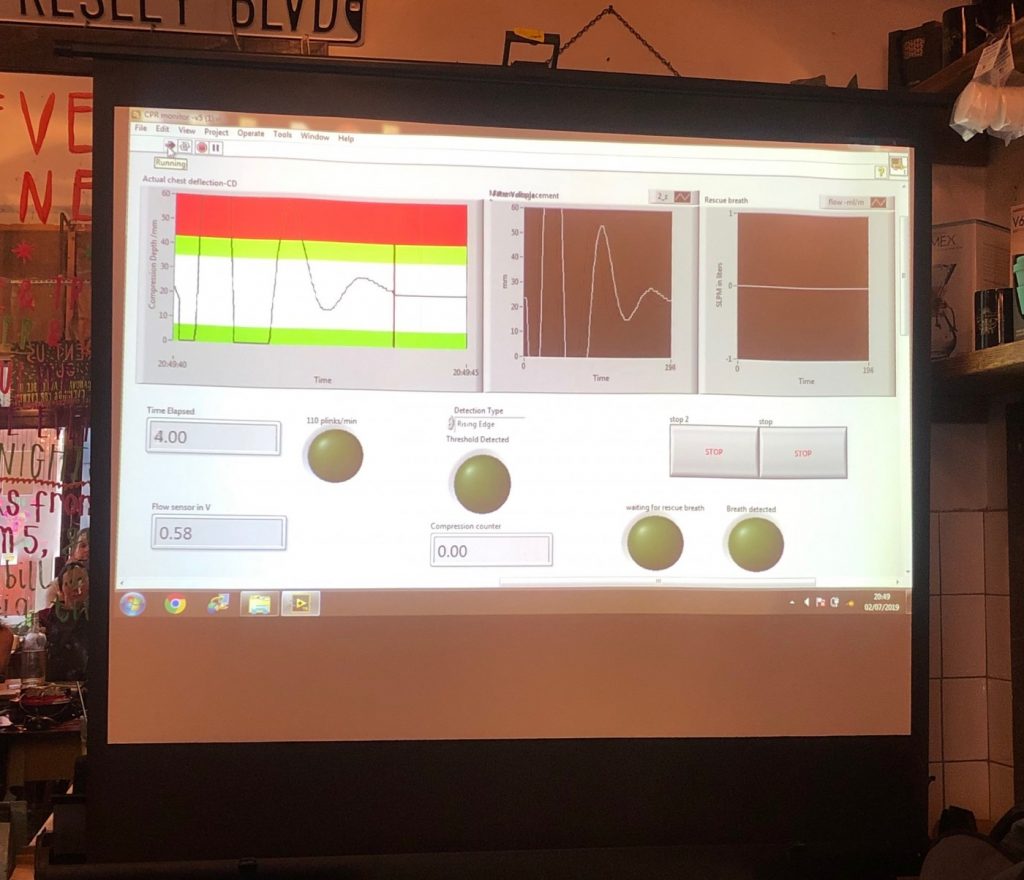
Debora’s Cafe Scientifique talk highlighted the epidemiology of cardiac arrest around the world, the variations in survival rates and surprisingly, how suboptimal the quality of CPR performance delivered by lay people, basic life support rescuers and highly trained rescuers can normally be. She also talked about how fast CPR skills decay and challenged the re-training schedule in hospitals, which is normally 1 or 2 years apart. “Even though it has been demonstrated that CPR skills diminish within months after training, hospitals still get away with re-training their members of staff yearly or even after 2 years. This needs changing…. But to change this practice we need to figure out a better one…”
One of the highlights of the evening was when the audience were given the opportunity to practice their CPR skills on the manikin using the real-time feedback system that is used in Debora’s research.

Debora Almeida reflects on her experience of presenting at Cafe Scientifique earlier this month;
Debora said “The experience of talking to an audience formed by lay people, healthcare professionals and academics was an interesting and enjoyable challenge. The audience engaged really well with insightful comments and relevant questions. It was a great opportunity to talk about the challenges and benefits of bystander CPR.”

This is complemented by feedback from one of the audience members; “For me, being a senior, the simpler the instructions the better. Simply having the knowledge that I must not waste vital time checking pulses etc. but start immediately with chest compressions gives me confidence should such a situation arise.”

Cafe Sci will be taking a break in August however we’re set to return on
Tuesday 3 September 2019!
Find out more about Café Scientifique and sign up to our mailing list to hear about other research events: www.bournemouth.ac.uk/cafe-sci
If you have any questions please do get in touch